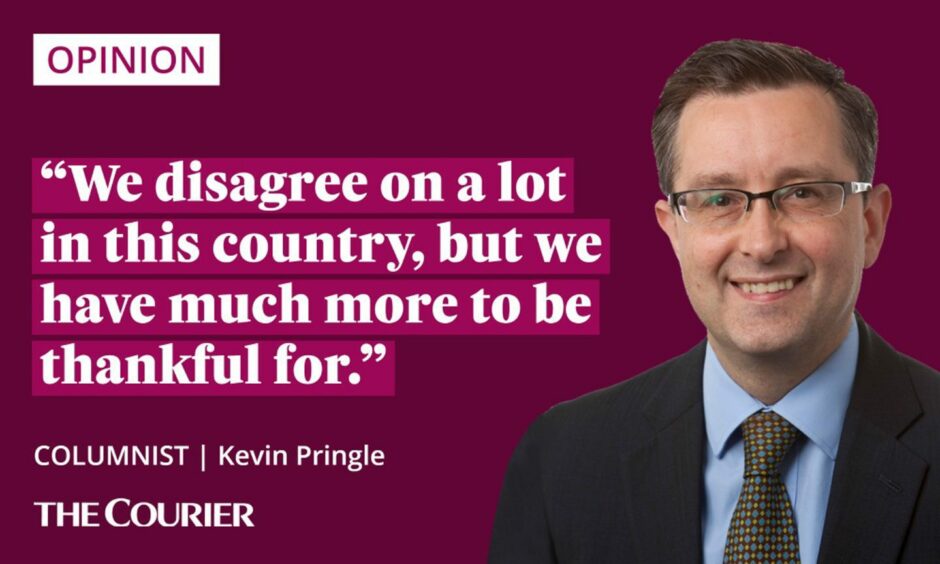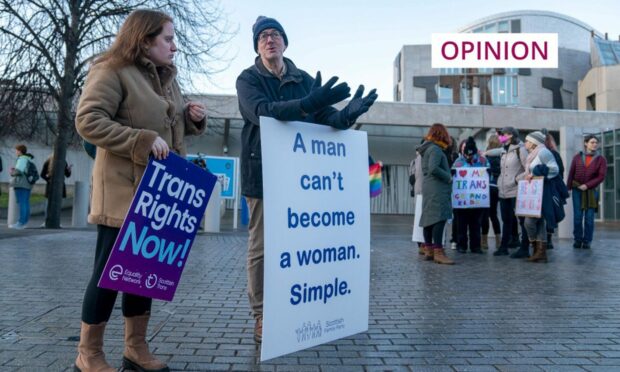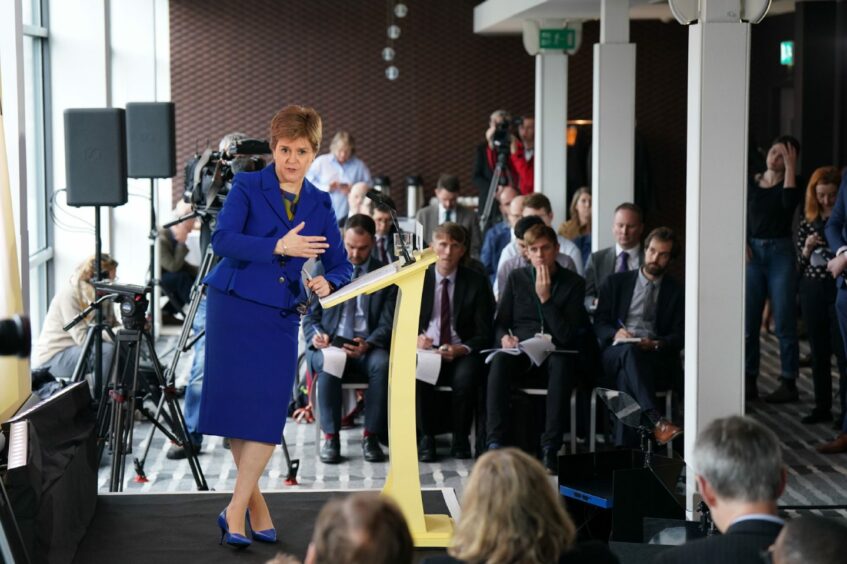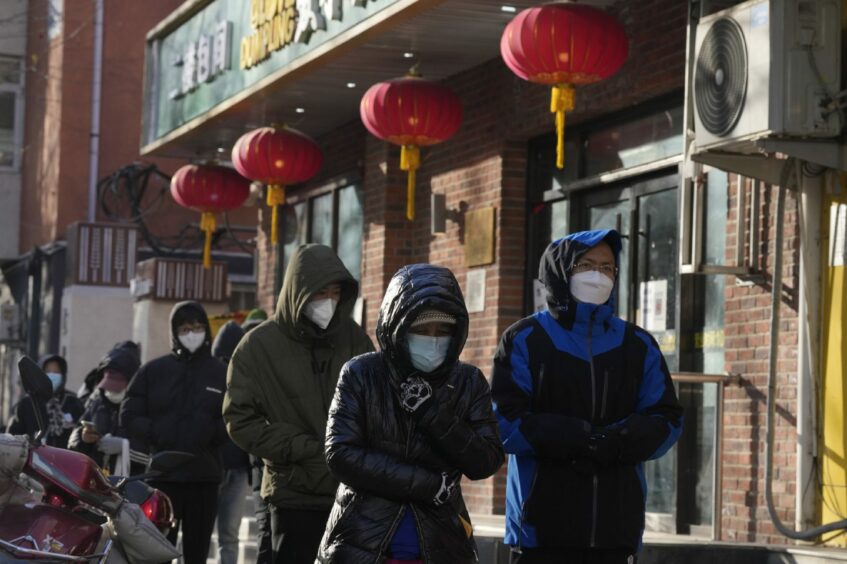It’s the time of year for coming together, yet it seems our political rows have rarely been as fractious.
At Holyrood, we are in the eye of the storm over legislation to move to a controversial system of self-identification for transgender people seeking a gender recognition certificate.
Last week, trans activists prevented the screening of a film at Edinburgh University, Adult Human Female, which offers a sharp feminist perspective on the issue.
It concentrates on concerns about a clash between transgender ideology and the sex-based rights of women and girls.

I viewed it online and found it informative and persuasive, and in no way deserving of being banned (or, in contemporary parlance, cancelled).
Regardless of how they have chosen to vote, I’d hope that all MSPs would watch the film, even if they strongly disagree with it.
So. I watched Adult Human Female. And I can see why some might be offended by it. But freedom of speech involves the freedom to shock & offend. And if you’ve watched it & were offended, do you not think these women have a valid point? As if not, you’re not being balanced IMHO.
— Roddy Dunlop KC (@RoddyQC) December 17, 2022
If you are confident in your arguments, there is no reason on earth not to listen to dissenting voices.
Independence is still a focus for democracy in Scotland
We end the year with Scotland’s constitutional future as high in the political agenda as it has ever been, and yet the issue is stuck.
Half a dozen polls in a row have put independence in the majority, and the Scottish Government was elected on a mandate last year to hold a referendum.
But Holyrood is not empowered to legislate for such a vote without Westminster consent, and the UK government is refusing to play ball in the hope that the issue will eventually go away.
Conservative governments tried the same blocking tactics in the 1980 and 1990s in relation to devolution, which caused the demand for a Scottish parliament to grow and solidify.
The cause was ultimately won.
I can’t say when or exactly how, but I predict a similar trajectory resulting in an independent Scotland.
Brexit divisions linger, but is UK Government listening?
Let’s move onto Brexit, because that has weird and wonderful features all of its own.
On referendum day back in 2016, two of the UK’s constituent parts – England and Wales – voted narrowly to quit the EU.
The other two – Scotland and Northern Ireland – chose more decisively to stay.
At the very least, that should have translated into the softest possible Brexit, including continued membership of the single European market.
And yet Tory prime ministers opted for a hard-boiled version of Brexit that is no good for anyone.
The ultimate irony is that public opinion south of the border has undergone a big shift, and is now consistently in favour of Britain being back in the EU.
The latest UK-wide poll of polls puts “in EU” support at 56%, with the “out” option trailing at 44%.
Ludicrous doesn't even begin to cover this 👇 @Jacob_Rees_Mogg telling an actual wine importer whose livelihood is collapsing because of Brexit that since Brexit it's much easier to import wine
They lied to get their Brexit – their lies are even more barefaced about its damage👇 pic.twitter.com/pZB9DQnv74
— Alex Taylor (@AlexTaylorNews) December 15, 2022
Unfortunately, it looks like being a long time away, if ever, before any UK government is willing to give a lead to this pro-European sentiment (or indeed before the EU is prepared to indulge Britain’s eccentric performance of the hokey cokey).
Scotland is a democracy, for better or worse
All these examples may point to certain defects in our democracy, including serious ones, which the aggro and abuse that passes for debate on social media make worse.
Alternatively, you might disagree with some or all of the observations above, but have other issues that get your goat.
In a sense, that’s the point.
Democracies, like families, come in all shapes and sizes and none of them are perfect.
But in Scotland we should bear in mind that even a bad democracy is better than no democracy at all.
At different stages in the past, some people believed that dictatorial forms of government, whether of the right or the left, were preferable and more effective than liberal democracy.
How wrong they were.
The rules of the game that frame our right to free speech; the means by which we elect those who govern us and how we are governed; the effectiveness of the checks and balances in the system.
These should all be endlessly debated and continuously reviewed, on the basis that they can always be improved, as times and circumstances change.
But the most important thing is that we have them.
Russia and China: authoritarianism in action
A glance at other ways of ordering the affairs of state shows what the alternatives lead to.
For example, mistakes were undoubtedly made in dealing with the pandemic in Scotland and across the UK, and these will be examined by due processes of public inquiry.
But whatever we got wrong as a democracy can be put into perspective by the scale of the authoritarian shambles imposed on its people by the Chinese regime.
From the most draconian control measures imaginable, China has now abandoned its “zero Covid” policy in favour of a free-for-all, amid inadequate vaccination and soaring infections.
And there will be zero openness about any of it.
In Russia, the catastrophe of its invasion of Ukraine is a function of the tyranny built up by Vladimir Putin.
We disagree on a lot in this country, but we have much more to be thankful for.















Conversation